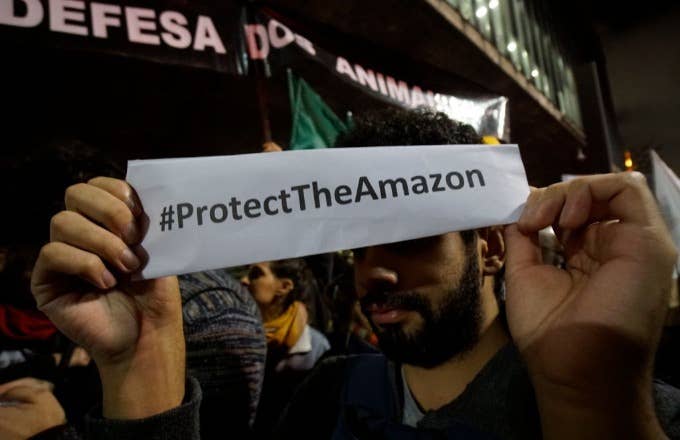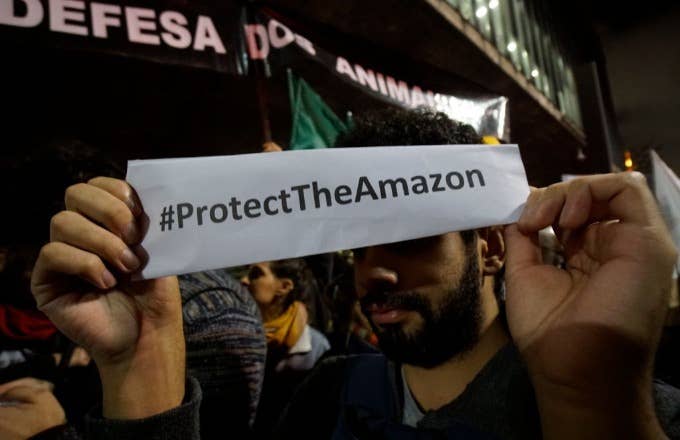
As the fires in the Amazon continue to inspire calls for greater worldwide emphasis on climate change and public pleas for international collaboration on methods of intervention, the information on these fires—from viral photos to a (since rejected) G7 agreement worth $20 million—is stacking up at a rate some may find hard to digest.
To that end, we've broken down some key must-knows associated with the heartbreaking blazes below.
What's happening?
The fires affecting Brazil's Amazon rainforest were reported earlier this month to be burning at the highest rate seen since the National Institute for Space Research (referred to as INPE) started tracking them in 2013. In 2019 alone, Brazil has seen 72,843 fires, over half of which—per CNN—are in the Amazon region. These figures mark an increase of more than 80 percent when compared against stats from the same timeframe in 2018.
But blaming the fires entirely on the dry season, INPE researcher Alberto Setzer said last week, isn't fair.
"The dry season creates the favorable conditions for the use and spread of fire, but starting a fire is the work of humans, either deliberately or by accident," Setzer said, pointing to cattle ranchers and farmers' land-clearing methods.
In a press release also released last week, environmental group Greenpeace spoke definitively on the connection between climate change-worsening practices and fires of this magnitude.
"Forest fires and climate change operate in a vicious cycle: as the number of fires increase, so do greenhouse gas emissions, increasing the planet's overall temperature and the occurrence of extreme weather events, such as major droughts," a Greenpeace rep said.
What is the impact?
In addition to the emissions problems pointed out by Greenpeace, deforestation in general is considered by environmental protection groups as a direct contributor to potential rainfall pattern changes. Such changes can affect everything from biodiversity in the region to overall human health.
Smoke from these particular fires has been shown via Copernicus satellite imagery to have spread into nearby areas in Paraguay, Peru, and Bolivia.
Looking at the larger environmental picture, it's been posited that continued deforestation increases could contribute to the Amazon region becoming a CO2 source by way of less oxygen being emitted. As Amazon Watch Finance Campaign Director Moira Birss explained, "indigenous people of the Amazon have been sounding the alarm" for years.
What are international governments and other leaders doing about it?
We all heard about Leonard DiCaprio's Earth Alliance putting forth $5 million toward Amazon rain forest preservation efforts, but what else is being done?
Brazil President Jair Bolsonaro has been condemned by many environmental groups and other world leaders for a rhetoric many say only serves to systematically dismantle the country's policy on such issues.
Speaking with reporters Monday, the same day the G7 agreed to the aforementioned $20 million pledge, Bolsonaro offered this, perAP:
"Look, does anyone help anyone—not including poor people, you know—without something in return? What have they wanted there for so long?"
Threats of trade deal blocks have ensued from other international leaders.
French President Emmanuel Macron, specifically, has been the subject of insulting remarks from Bolsonaro that at one point included wife Brigitte.
Speaking during a press conference Monday, Macron condemned the remarks as "sad" and hoped Brazil would one day see renewed leadership.
"I have great respect for the Brazilian people and can only hope they soon have a president who is up to the job," Macron said.
As for that $20 million from the G7, it was later reported that Brazil would be turning it down. However, there appears to be some confusion regarding this rejection, as CNN reported Tuesday that Bolsonaro had suggested he would respond to the offer only if Macron's comments were withdrawn.
What's next?
As Germany and others have backed Macron's message of urgency on this matter, the question turns to how everyday people—regardless of location—can get involved in united betterment practices.
For forest-specific concerns, you can keep an eye on rainforest-protecting goods by becoming familiar with the Rainforest Alliance-approved products ranging from bananas to teas. You can also donate to the Alliance.
The Rainforest Trust, the Rainforest Action Network, the World Wildlife Fund, the Amazon Conservation Team, and the aforementioned Amazon Watch group are other organizations who offer donation options designed to benefit the affected regions.
You can also ink a petition, including this one from Greenpeace, as well as make an effort to let your local political leaders know where you stand on matters of Amazon protection and climate change at large.
Speaking of climate change, consider reducing your involvement with the meat industry and—when possible—walk instead of drive and/or carpool with friends or co-workers.

